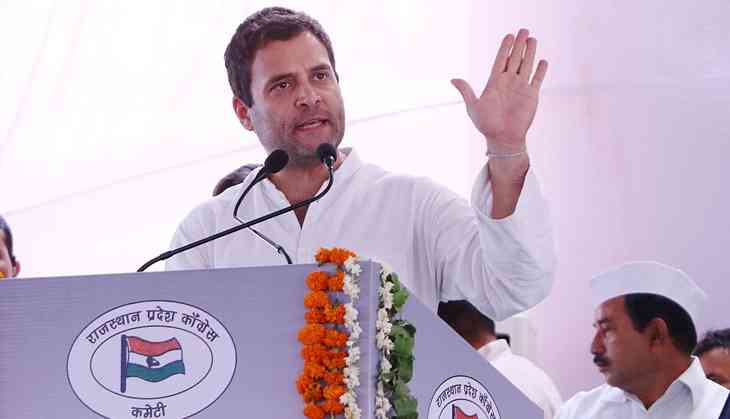Internal poll doesn’t matter, Rahul as Congress chief was a foregone conclusion

After having been reprimanded by the Election Commission of India (ECI) for not holding internal elections, Congress was forced to expedite the exercise which eventually would pave way for party vice-president Rahul Gandhi to take over as president from his mother Sonia Gandhi who has held the post for 19 years.
Earlier this year, the poll watchdog had asked a reluctant Congress to finish its internal polls by 30 June but the party sought a six months extension. The ECI agreed and set 31 December as the deadline for holding organisational polls which will eventually see Rahul being crowned as Congress' next president.
Elections would be held for the post of the president only if there are other nominations but it is almost certain that Rahul would become the next president unopposed. The reason for such an assumption stems from the fact that despite these internal elections, no one in the party would dare to contest against the Gandhi scion.
In fact, Congress' chief spokesperson Randeep Singh Surjewala claimed that Rahul remains the “unquestioned choice” of party workers to take over as the party president. “Rahul continues to remain the unquestioned choice of every Congress leader for being the president. He is democratic enough, and the party is resilient enough, to welcome anybody to come and aspire for any post in the party, including the post of president,” Surjewala said.
Meanwhile, reports claimed that the party has asked all its state units to pass a resolution requesting the Gandhi scion to take over as the party president. Once the resolution is adopted, Rahul taking over the party remains only a formality.
Moreover, another resolution empowering party president to nominate all office bearers has also been sent to various state units. This would mean Rahul would have the opportunity to create his own team.
Are Congress elections truly democratic?
Now Rahul may have chosen to bring in internal democracy in the party by holding elections but his own party members feel that these elections are not truly democratic in nature.
It is for this very reason that many regional leaders label internal elections as “a mere formality”. “If anyone is under the perception that these would be free and fair elections then he doesn't know much about Congress. Whoever gets elected even at the district level has some big name backing him. These elections are just a sham though the efforts of Rahul to democratise the party is certainly praiseworthy. But, sadly Congress is anything but democratic,” said a senior state leader.
Another leader from a southern state, who is also a poll observer, pointed that only those who owe allegiance to a certain powerful faction end up grabbing all the top posts at the state level. He said, “The MLA would have his own band of followers whom he wants to accommodate. Similarly, the MP and other regional leaders have similar demands. It is very rare to see that a genuine grassroots leader gets a chance to get elected through this process.”
Further, he went on to add that in these circumstances no one would dare to contest against Rahul as he or she would thereafter be castigated for not backing the Gandhi scion. According to the party constitution, any 10 delegates “may jointly propose the name of any delegate for election as the President of the Congress”.
The delegates comprise members of the Electoral College and to expect 10 of them to name anyone for the post of president except for Rahul is bit far-fetched. Further, all such proposals should be sent to the Returning Officer (RO) on or before the date set by the CWC.
“The Returning Officer shall publish the names of all persons so proposed and it shall be open to any person whose name has been so proposed to withdraw his candidature within seven days of the proposed names by writing to the Returning Officer to that effect,” reads the party constitution.
Further, the constitution also claimed that after eliminating names of those who have withdrawn, the RO shall publish the names of remaining candidates and circulate them to PCC. “If, after elimination, there remains only one candidate, he shall be declared duly elected as President of the next Congress Session,” read the Constitution.
This is most likely to be the scenario as far as Rahul's elevation is concerned and he in all probability would be declared as president unopposed. In fact, Sitaram Kesri was the last elected president of Congress and was unceremoniously removed after which Sonia Gandhi took over. Since then Sonia has been the party president making her the longest serving president in Congress' history.
Moreover, the party's most powerful body, the Congress Working Committee (CWC) on 6 June had approved the minutes of the last CWC meeting held in November 2016. Informally, this cleared the deck for Rahul's elevation. In the last year's meeting, all members of the CWC unanimously requested Rahul to take over the reins of the party from Sonia.
To sum it up, internal elections were forced on Congress by the ECI and not taken up by the party voluntarily to strengthen internal democracy. However, even if there were no elections, it was a foregone conclusion that Rahul would replace his mother and it was only a matter of time before he made up his mind.
First published: 5 October 2017, 23:14 IST

